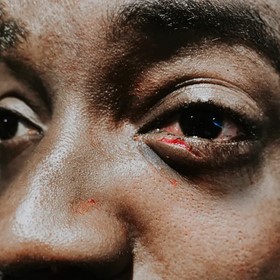
Father, author, podcaster; producer, TV pundit and presenter, entrepreneur; lyricist, victim and survivor of racist violence. In just thirty-three years, the highly-acclaimed Guvna B has lived a life which has been as varied as his elite talents. And now – a decade and a half into a career which has already brought him three MOBO Awards, three Urban Music Awards, and tens of millions of streams – he has created a body of work which brings together his diverse worlds in one powerful, harrowing and uplifting listen. The Village Is On Fire, his tenth studio album, is his richest and most rewarding work to date. Against a soundscape that evokes London in all its agony and glory – a seamless blend of soul, house, grime, Afrobeats and more – he grapples with the aftermath of an unprovoked and racially motivated attack.
On that fateful morning of 24 August 2021, Guvna B suddenly had hot coffee thrown over him and was punched in the face. After a few months of looking for his assailant, the police eventually closed the investigation due to a lack of leads. This incident tears away his confidence and forces him to face the world not as Guvna B, the confident and prominent social commentator, but as Isaac Borquaye, the sensitive and thoughtful son of Ghanaian immigrants.
Yet this supreme test of character is one at which Guvna B excels: since the greatest strength of his work, whether he is scribbling alone in his notebook or onstage in front of a roaring crowd, is to explore what it means to be vulnerable. It is easy to list his achievements. There is his chart-topping single “Massive”, an ode to his beloved West Ham United; there is his remarkable podcast about grief that he launched following the death of his father, The Loss Tapes; and there is Unspoken, his bestselling memoir and meditation on masculinity that was praised by George the Poet and Benjamin Zephaniah. Yet it is harder to express the impact that he has had on the community that he has served for most of his adult life. That is because for the numerous prizes that he has won, Guvna B has achieved something that goes beyond mere trophies. He is one of the few MCs who has managed to bring together the disparate worlds of gospel and grime: he is one of the architects of the bridge that artists such as Stormzy walk across with joy. Like Stormzy, too, his work pays homage to the genres and the greats who came up before or alongside him. Indeed, The Village Is On Fire is maybe best understood as a sibling to Kano’s sublime Hoodies All Summer. That is to say, a record which does not preach to its East London neighbourhood about its dangers and challenges, but which instead invites those surroundings to join a conversation, and even to sing a hymn in their honour.
On that fateful morning of 24 August 2021, Guvna B suddenly had hot coffee thrown over him and was punched in the face. After a few months of looking for his assailant, the police eventually closed the investigation due to a lack of leads. This incident tears away his confidence and forces him to face the world not as Guvna B, the confident and prominent social commentator, but as Isaac Borquaye, the sensitive and thoughtful son of Ghanaian immigrants.
Yet this supreme test of character is one at which Guvna B excels: since the greatest strength of his work, whether he is scribbling alone in his notebook or onstage in front of a roaring crowd, is to explore what it means to be vulnerable. It is easy to list his achievements. There is his chart-topping single “Massive”, an ode to his beloved West Ham United; there is his remarkable podcast about grief that he launched following the death of his father, The Loss Tapes; and there is Unspoken, his bestselling memoir and meditation on masculinity that was praised by George the Poet and Benjamin Zephaniah. Yet it is harder to express the impact that he has had on the community that he has served for most of his adult life. That is because for the numerous prizes that he has won, Guvna B has achieved something that goes beyond mere trophies. He is one of the few MCs who has managed to bring together the disparate worlds of gospel and grime: he is one of the architects of the bridge that artists such as Stormzy walk across with joy. Like Stormzy, too, his work pays homage to the genres and the greats who came up before or alongside him. Indeed, The Village Is On Fire is maybe best understood as a sibling to Kano’s sublime Hoodies All Summer. That is to say, a record which does not preach to its East London neighbourhood about its dangers and challenges, but which instead invites those surroundings to join a conversation, and even to sing a hymn in their honour.



